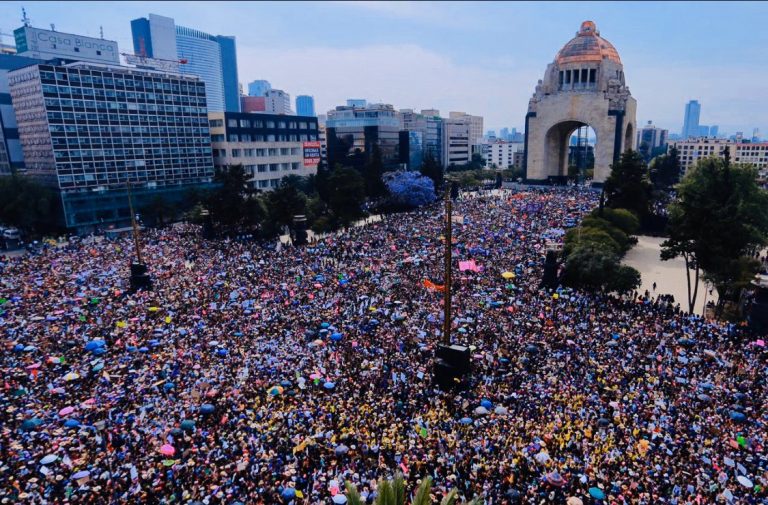If any country on earth should be breathing a huge sigh of relief about now, it’s Mexico. Four years of bashing, bullying, trade threats and White Supremacist machinations will presumably end with the ignominious exit of Donald J. Trump. That’s got to be good news.
Yet Mexico, for the most part, did not respond with cheering in the streets. There was a marked absence of the universal enthusiasm for the post-Trump reset on U.S.-Mexico relations that one might expect, considering that more than 90% of the population held a negative opinion of Trump, according to polls. That’s even higher than Trump’s 79% disapproval rating among Hispanics in the U.S.
The mixed reaction had much to do with the response of Mexico’s president Andres Manuel López Obrador. López Obrador, known by his initials as AMLO, refused to recognize the election results, announcing he would wait for Trump’s legal challenges to be resolved. Even after Trump authorized the GSA to begin the transition, Lopez Obrador has held back, standing almost alone on the world stage, in the questionable company of Vladimir Putin and Jair Bolsonaro. At this writing with most state results certified, Mexico’s center-left leader still has not congratulated Joe Biden.
Although AMLO argued that his decision shows Mexico’s commitment to non-interference in the internal affairs of other countries, the pretext doesn’t hold water. First, because out of eight elections held during his administration so far, AMLO joined the rest of the world in the common practice of recognizing the winner after the vote count in six of those nations. Second, because the reason given — to await the result of court cases — explicitly gave credence to Trump’s baseless legal claims. And finally, because even as the court cases crumbled and Trump’s attempt to influence state legislatures not to certify or to release electors failed, AMLO still did not recognize Biden.
This means that the Mexican government’s stance is not a diplomatic principle, but either political or transactional—political in the sense of actually preferring a Trump victory and attempting to bolster a fizzled GOP attempt to revert the popular vote, or transactional in the sense of getting something in return for humoring Donald Trump. The rumors of secret deals abound. Most suspicion falls on the bizarre capture and liberation of Mexico’s former Secretary of Defense, General Salvador Cienfuegos.
Cienfuegos was arrested in Los Angeles and charged with drug trafficking and money laundering, following a multiyear investigation by the DEA. Prosecutors claimed to have a strong case against the general, including taped conversations with the H-2 cartel. Then William Barr, at Trump’s bidding, intervened in the New York District Court and Cienfuegos was sent back to Mexico with no charges. Trying Cienfuegos in the US would likely have revealed widespread corruption in the armed forces, at a time when AMLO has gone out of his way to keep the armed forces close, handing them construction projects, port management and even COVID vaccination distribution. Returning Cienfuegos to Mexico where the government can control a trial or obviate it altogether is a political favor. But for what in return?
The other possibility is concern over what Trump might do in the two and half months between his defeat and his departure. Fear of the real power the US has over Mexico has been the driving force of US-Mexico relations under AMLO. Trump’s threat to impose a 25% tariff led to a Mexican crackdown on Central American migrants and the infamous “Remain in Mexico” program to send asylum seekers back over the border to wait months for legal hearings in dangerous refugee camps.
We may never know realpolitik behind the AMLO’s constant praise of a dishonest businessman who sought to establish unfettered white, male rule in the world’s most powerful nation. So where does that leave us now? The Biden administration is reportedly miffed, but has nothing to gain by punishing Mexico. Biden will have to move fast to undo Trump’s deals and make the relationship more transparent and oriented to human rights and common principles. AMLO’s Trump-appeasement policy has created obstacles to future efforts to rebuild badly damaged US-Mexico relations, but not insurmountable ones.
Biden comes into office with a divided country and party, but a strong and mobilized base for social change. He also takes office with a political debt to Hispanics, and to progressives. AMLO completed his second year in a surprisingly strong position, with an estimated 60% approval rating despite the tragic results of his laissez-faire strategy on COVID-19, economic pain and political blunders. Programs that prioritize the poor and target corruption have kept alive the dream of social justice under his government. An alliance to support the goals of the Fourth transformation in Mexico and progressives in the United States could be the basis for a powerful and just relationship that could change history.
But let’s be realistic. Both presidents will likely disappoint on that count. Biden has been a staunch supporter of the militarized war on drugs and private sector-led development that feeds inequality. AMLO has talked about ending neoliberalism as he promotes megaprojects and extractive industries that displace indigenous peoples and damage the environment.
Fortunately, the real hope doesn’t lie with the governments. It relies on recognizing the power and vision of progressive grassroots organizing. The massive participation of the Latino population in the elections—not just in terms of record voter turnout, but also in mobilization—was in general a targeted campaign to oust Trump in order to move forward on a much broader, longer-term program. United We Dream, the 400,000 strong immigrant youth led network based on DACA students, stated shortly after the election. “we rolled out one of the largest electoral programs ever led by immigrant youth in the United States… This decisive victory is a mandate by voters and those of us who couldn’t vote but energized and mobilized others to the polls, to reject greed and white supremacy, and to vote for policies that value people over profit. But our win doesn’t end here.” The surge in grassroots mobilization in the US is an opportunity for movements to build common cause.
Immigration obviously links the two nations, but so do other issues. The Movement for Black Lives’ calls for racial justice, defunding the police and ending brutality should find easy echo with Mexican demands to withdraw the military from public safety, end the war on drugs and reform prisons. Movements in defense of indigenous people’s rights and lands, to end violence against women and stop global warming, and for labor rights and drug policy reform (Mexico just legalized marijuana) already know each other, but they have an erratic history of joint efforts.

March 8 Women’s March, Mexico City, Mexico. Photo: Omar García Ponce/Twitter.
As the leaders retool the relationship, it’s time for movements to do the same. Stale arguments on how progressive the presidents are lead to nowhere. They will always have limitations. The challenge is to use the grassroots energy, the radicalization of the past six months, the emergence of new social leaders and the increased articulation of movements to look over the border as well. Before the pandemic, Mexico also experienced record numbers in the streets, in the March 8 Women’s March. Harnessing that energy and commitment and channeling at least part of it into binational efforts can only make both sides stronger.
Laura Carlsen is the director of the Americas Program of the Center for International Policy based in Mexico City.
Please support independent media today! Now celebrating its 20th anniversary, The Indypendent, a monthly New York City-based newspaper and website, is still standing but it’s not easy. Make a recurring or one-time donation today or subscribe to our monthly print edition and get every copy sent straight to your home.


Spread the word